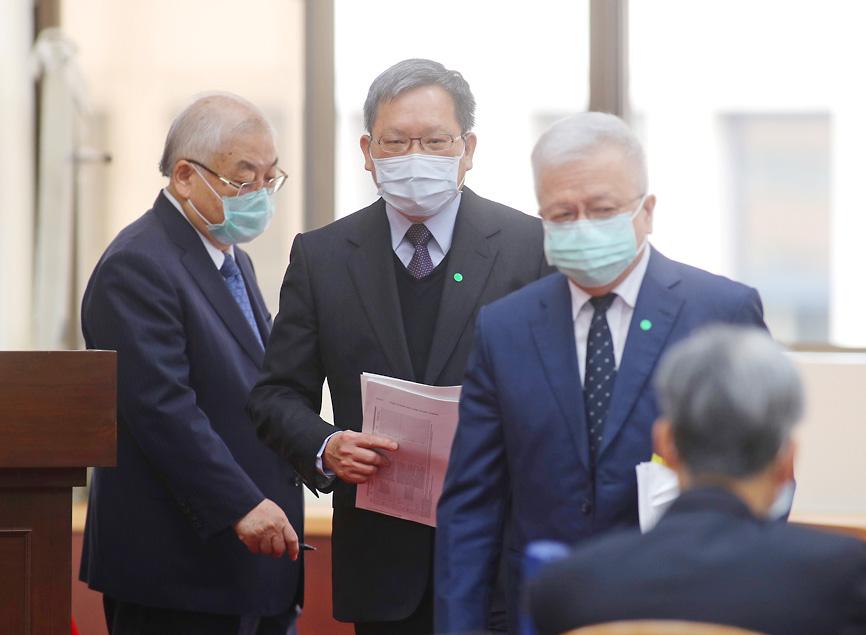The COVID-19 pandemic might persist for nine months, from an earlier estimate of three months, and would wipe out almost all economic gains this year in the absence of the government’s relief and stimulus measures, top statistics and monetary officials said yesterday.
The pandemic could erase GDP growth by 1.8 to 2.3 percentage points this year through disruptions to trade channels abroad and consumer spending at home, Directorate-General of Budget, Accounting and Statistics Minister Chu Tzer-ming (朱澤民) told a meeting of the legislature’s Finance Committee in Taipei.
That would leave Taiwan with a parlous growth of between 0.4 percent and 0.9 percent, without government intervention, Chu said.

Photo: CNA
The statistics agency in February set its forecast for GDP growth this year at 2.37 percent, with the pandemic expected to affect China for three months, based on the global experience with SARS in 2003.
However, the novel coronavirus last month rapidly spread to Europe, the US and other parts of the world, forcing world leaders to shut non-essential businesses and international travel, and impose social distancing before the development of a vaccine.
While uncertainties remain high, Chu said the Taiwanese economy could still grow between 1.3 and 1.8 percent this year, bolstered by government relief and stimulus packages.
A special aid fund of NT$60 billion (US$2 billion) has cleared the legislature and the Cabinet is to propose an extra NT$150 billion later this week to help companies and households weather the virus shock, Chu said.
The package would shore up GDP by 0.9 percentage points, he said.
The goal now is to maintain an economic expansion of at least 1 percent, instead of 2 percent as earlier forecast, provided the world could return to normalcy in the third quarter, Chu said.
The IMF forecast last week that Taiwan’s economy would contract 4 percent is excessively pessimistic and inconsistent with its projected unemployment rate of 4.4 percent, he said.
An economic decline of 4 percent would put far more people out of work than an increase of 70,000 to 80,000 as the IMF suggested, he added.
A central bank official agreed, saying the international research body had underestimated Taiwan’s economic might for years.
The IMF does not have a designated unit to study Taiwan’s economy, accounting for its lack of accuracy, central bank Deputy Governor Yen Tzung-ta (嚴宗大) said.
The global economy is most likely to stage a U-shaped recovery, but much hinges on when the virus could be brought under control, Yen told legislators.
The central bank can make quick responses if necessary after cutting interest rates by 25 basis points last month, Yen said.

TRADE WAR: Tariffs should also apply to any goods that pass through the new Beijing-funded port in Chancay, Peru, an adviser to US president-elect Donald Trump said A veteran adviser to US president-elect Donald Trump is proposing that the 60 percent tariffs that Trump vowed to impose on Chinese goods also apply to goods from any country that pass through a new port that Beijing has built in Peru. The duties should apply to goods from China or countries in South America that pass through the new deep-water port Chancay, a town 60km north of Lima, said Mauricio Claver-Carone, an adviser to the Trump transition team who served as senior director for the western hemisphere on the White House National Security Council in his first administration. “Any product going

STRUGGLING BUSINESS: South Korea’s biggest company and semiconductor manufacturer’s buyback fuels concerns that it could be missing out on the AI boom Samsung Electronics Co plans to buy back about 10 trillion won (US$7.2 billion) of its own stock over the next year, putting in motion one of the larger shareholder return programs in its history. South Korea’s biggest company would repurchase the stock in stages over the coming 12 months, it said in a regulatory filing on Friday. As a first step, it would buy back about 3 trillion won of paper starting today up until February next year, all of which it would cancel. The board would deliberate on how best to effect the remaining 7 trillion won of buybacks. The move

China’s Huawei Technologies Co (華為) plans to start mass-producing its most advanced artificial intelligence (AI) chip in the first quarter of next year, even as it struggles to make enough chips due to US restrictions, two people familiar with the matter said. The telecoms conglomerate has sent samples of the Ascend 910C — its newest chip, meant to rival those made by US chipmaker Nvidia Corp — to some technology firms and started taking orders, the sources told Reuters. The 910C is being made by top Chinese contract chipmaker Semiconductor Manufacturing International Corp (SMIC, 中芯) on its N+2 process, but a lack

NVIDIA PLATFORM: Hon Hai’s Mexican facility is to begin production early next year and a Taiwan site is to enter production next month, Nvidia wrote on its blog Hon Hai Precision Industry Co (鴻海精密), the world’s biggest electronics manufacturer, yesterday said it is expanding production capacity of artificial intelligence (AI) servers based on Nvidia Corp’s Blackwell chips in Taiwan, the US and Mexico to cope with rising demand. Hon Hai’s new AI-enabled factories are to use Nvidia’s Omnivores platform to create 3D digital twins to plan and simulate automated production lines at a factory in Hsinchu, the company said in a statement. Nvidia’s Omnivores platform is for developing industrial AI simulation applications and helps bring facilities online faster. Hon Hai’s Mexican facility is to begin production early next year and the